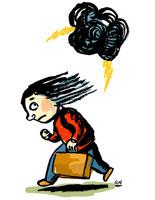I read an interesting bit today, relevant to those folks who are getting covid, or their loved ones are getting covid, and going to the hospital, and still they refuse to accept the dire nature of the situation. The behavior we are seeing (and it's remedy) are well known... in the study of confidence games, fraud and grift.
There comes a time in every scam in which the victim figures out that they've been had. But the most common behavior is not to report the scam to authorities and add information to bring the grifter to justice. No - most victims keep their moths shut... because it is embarrassing.
It is deeply, profoundly, and indeed identity-challengingly embarassing. Fraud generally depends on making you feel like you are making the smart and right choice that others won't make. You identify as a shrewd individual, but the grift reveals you to be... just an ordinary, easily-fooled mark.
The mark has two choices - accept the loss, or reject the fact that it was all a grift. Up to the moment of this choice, the mark is a victim, and we can have some empathy for that. However, they remain on the hook for their choice at this point, ethically speaking. But, many choose to reject that there was a grift, and that's dangerous, because it perpetuates the grift to others.
Society, then, has two basic choices -
1) Deliver appropriate social consequences for their anti-social behavior. Refuse to be around them, and make it clear why, and reject the narrative of being a victim - focus instead on asking what they are doing to prevent needless harm. This is what most of us think of when we consider dealing with these issues. However, it is a road filled with direct conflict.
2) Employ what in the study of fraud is called a "cooler". The cooler's job is not to absolve the mark, or allow them to view themselves as victims. The cooler helps them redefine themselves in a way that reconciles to reality and allows them to move forward.
Those of us outside the mark's community cannot act as coolers. The mark doesn't give a fetid dingo's kidney if they have the respect of random people on the internet. They have communities that matter to them, that they use to define their role in the world - sometimes called "reference groups" - groups the mark refers to when they consider who they are. Church communities, for example, are often reference groups. The cooler needs to be a face from such a group.
Early on, the work of coolers is often rejected - we have seen some members of Congress who have tried to move beyond the fraud narrative be rejected, for example. But the more coolers you have, the more they become difficult to ignore. The job of society, in this case, becomes to find the coolers, and support them. Allow them to help their communities redefine themselves to be something that no longer embraces the con.
Edit to add: Here's an example of a cooler -



